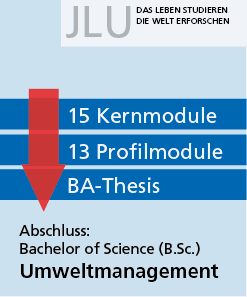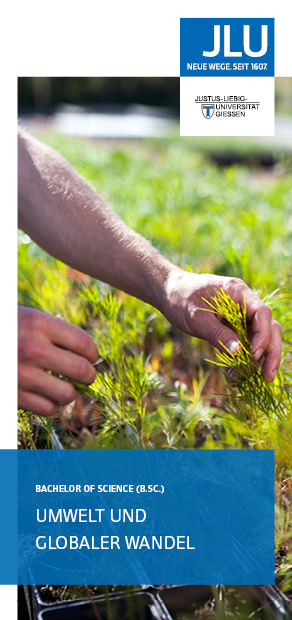Environment and Global Change (B.Sc.)
Taught in German
Overview
-
Number of enrolled students
451 students are enrolled in this bachelor degree course (as of winter semester 2017/18).
Accreditation
since 28 September 2007
- Overview
-
Contents
The Bachelor's programme Environment and Global Change deals with the major environmental issues of our time. How do we conserve resources such as water, soil and energy? How do we use them intelligently and sustainably? How do we shape agriculture in an environmentally friendly and forward-looking way? How do we produce food, drinking water, fibres, secondary raw materials and energy for a growing world population?
The degree programme has a natural science focus and is interdisciplinary, which means that students deal with issues from different disciplines. The programme includes subjects such as chemistry, mathematics and statistics, physics, biology, microbiology, ecology, hydrology and soil science. Students develop skills to develop and implement concepts for the sustainable use of resources.
Agriculture plays an important role in this. As the largest user of the land surface, it has a decisive importance for the sustainable use and provision of resources. The broad orientation of the degree programme offers the best prerequisites for a holistic view of sustainability aspects in the thematic field of agriculture - food - environment.Subject-specific prerequisites
In addition to the formal entry requirements (see application), we expect an interest in natural sciences, a certain down-to-earth attitude and an interest in technological issues. Basic knowledge of mathematics, chemistry and biology is advantageous. JLU offers preliminary courses in which you can refresh your knowledge before starting your studies. This way you are optimally prepared for your studies.
Composition of the Study Programme
- Degree BSc
-
Degree
Bachelor of Science (BSc)
- Duration of studies 6 Semester 180 Credit Points (CP)
-
Duration of Studies
6 Semesters - 180 Credit Points (CP)
- Composition of the Study Programme
-
Composition of degree programme

The course content is divided into modules. Each module has a scope of 6 CP (4 semester hours per week) and concludes with an examination. The grades achieved in the individual module examinations result in the final degree grade. 15 of the modules are compulsory (core modules), 13 modules are profile modules and can be selected from the entire range of courses offered by the department. The Bachelor's thesis corresponds to the scope of two teaching modules.
Individual specialisation takes place through the choice of profile modules. The degree programme is successfully completed when all modules have been passed.
- Modules
-
Components of the study programme
The programme consists of 15 core modules (compulsory modules) and 13 profile modules (elective modules). Each module has a scope of 6 CP (4 hours per week for one semester) and concludes with a course-related examination. The grades achieved in the individual module examinations result in the final degree grade. In addition, the programme includes a Bachelor's thesis, which is equivalent to 2 modules. With this, you prove that you are able to independently prepare a scientific paper.
Individual profile
The development of an individual profile plays a major role in the degree programme. Our students decide for themselves whether they want to acquire a broad all-round knowledge or prefer to specialise, whether they want their studies to be more practice-oriented or scientific and theoretical. They can choose profile modules from the complete range of courses offered by the Department 09 or even from other departments at JLU.
Practical relevance
In addition to choosing practice-oriented modules, students have the opportunity to complete an internship to gain a first insight into professional life. Module BP 144 "Professional Internship" corresponds to 12 CP and can be chosen as a profile module in all Bachelor's degree programmes of Faculty 09. In this way, students familiarise themselves with the professional world and get suggestions for the individual organisation of their further studies. The Internship Office maintains a database of suitable companies and institutions and supports students in their search for a suitable internship.
Study Plan
1st semester 2nd semester 3rd semester Chemistry Practical Training Physics Environmental Pollutants Fundamentals of Ecology and Soil Science Soil and Landscape Ecology Applied and Environmental Microbiology Biology Landscape Water Resources Sustainable Cycles and Waste Management
Economics and Business Administration I Agriculture and the Environment General and Molecular Microbiology Mathematics and Statistics Environmental Economics and Environmental Communication Specialisation Module 1 4th semester 5th semester 6th semester Management of Nature and Landscape Specialisation Module 6 Specialisation Module 11 Specialisation Module 2 Specialisation Module 7 Specialisation Module 12
Specialisation Module 3 Specialisation Module 8 Specialisation Module 13
Specialisation Module 4 Specialisation Module 9 Bachelor's dissertation Specialisation Module 5 Specialisation Module 10 Bachelor's dissertation Specialisation modules
Broad all-round knowledge or specialisation - both are possible. Our students have it in their hands, they put together their studies according to their individual inclinations from the whole range of our offer. From a selection of over 80 modules, students can choose profile modules from the following topics, for example:
- Landscape planning
- Landscape, water and material balance
- Resource management
- Soil resources and soil protection
- Microbiology
- Bioinformatics
- Communication and extension
- Organic Farming
- Renewable raw materials and bioresources
- Plant cultivation and plant breeding
- Agricultural, Food and Environmental Policy
- Market theory
- Insect Biotechnology
Application
- Commencement of Studies in the Winter Semester
-
Commencement of studies
Only possible in the winter semester
- Entrance Requirements Abitur ohne Praktikumsnachweis
-
Entrance requirements
- Applicants must have an Abitur (German school leaver's examination for university entrance) or equivalent. More on this...
- Certification of a pre-professional practical period is not required.
-
Special regulations apply to foreign applicants or those who gained their university-entrance qualifications abroad. Read more...
- Application not limited only winter
-
-
Application / Enrolment
-
The study programme is not subject to admission restrictions.
-
The enrolment period for the winter semester begins at the beginning of June.
-
The end of the enrolment period is determined anew each year, please enquire in the application portal during the enrolment period.
Different rules apply in some cases for international applicants. More...
-
-
Career Options
- Career Options
-
Options for further study at JLU
After successful completion of the Bachelor's degree, the following consecutive Master's degree programme can be studied at JLU:
- Umweltwissenschaft (M.Sc.)
- Agrar- und Ressourcenökonomie (M.Sc.)
- Informationstechnologie in den Agrar- und Umweltwissenschaften (M.Sc.)
- Nachhaltige Ernährungswirtschaft (M.Sc.)
- Nutzpflanzenwissenschaften (M.Sc.)
- Sustainable Transition (M.Sc.) - (taught in english)
- Tranistion Management (M.Sc.) - (taught in english)
Additionally, JLU's Faculty 09 offers the following Master's degrees.
Career options
The degree programme Environment and Global Change enables you to work in various professional fields. After successful completion of the degree, you will have acquired both an understanding of environmentally-related scientific problems of rural economy and the ability to work out solutions for complicated issues.
Potential employers are industrial and service companies, associations, enterprises, organisations in the field of development aid as well as companies that fulfil tasks in the field of nature conservation and environmental monitoring as well as regional public utilities for water procurement and waste and wastewater disposal. Occupational fields also arise in the area of implementing EU measures for the conservation, development and renaturation of cultural landscapes through environmentally sound agriculture.
Further Information
- Further Information: Documents
-
PDF documents for the courses of study
- Flyer (in German)
- Study guide (in German)
Examination- and study regulations
- Special regulations (in German)
(with module descriptions and module plans) (in English)
(Please note that only the German version of the modules is offical and legally binding. The english Version is for informative purposes only.) - General study regulations for modular and multi-stage study programmes
Courses offered in the course catalogue
- Electronical course catalogue (in German)
- Bachelor's Degree Programmes of Faculty 09
- International pages
-
Please have a look at our International Pages for more information in English.
- Any Questions
-

Any Questions?
Information- and advisory services of JLU can be found under the category “contact” on this page!
- Help
-
Do you need assistance in choosing the right courses of study?
- Offers: Courses of study
-
Which courses of study suits me best?

Ask Justus offers information for prospective students
Events for prospective students

There is a whole range of events offered by JLU, current events can be found under “news”:
www.uni-giessen.de/studium (in German)
Contact
- Contact
- Subject Advisors
- Environmental Management
-
Team for Studies and Doctorates of the Faculty 09
Academic advisor
Prof. Dr. Jan Siemens
Institut für Bodenkunde und Bodenerhaltung
Heinrich-Buff-Ring 26-32
35392 GießenTel.: 0641 - 99 37101
Office hours: by appointment
E-Mail: Jan.Siemens@umwelt.uni-giessen.de
- Central Study Advisor
- Anja Staffler
- Central Student Services
-
- Students office →
(for formal matters like matriculation) - Central student advisory office
(advice for students & prospective students) - Hotline Call Justus
(first contact for all matters pertaining to studies) - International office →
(for international students)
- Students office →

